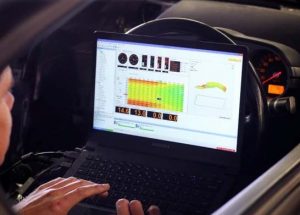Tuning is the process of calibrating a vehicle’s engine to optimize its performance and fuel economy. Through tuning, a car can be fine-tuned to work more efficiently, reducing fuel consumption and improving overall performance. This can save money on fuel costs, as well as reduce emissions from the vehicle. There are several different methods for tuning a vehicle for fuel efficiency, including adjusting timing, advancing the spark plugs, selecting the right air/fuel ratio, reducing engine knock and detonation during tuning process, utilizing closed-loop and open-loop strategies for fuel efficiency, and other considerations.
Adjusting Timing to Achieve Maximum Efficiency
One of the most common ways of optimizing your vehicle’s performance is by adjusting its timing settings. This process involves altering the timing of when each cylinder fires when your engine is running at various speeds. By adjusting these settings you can significantly improve your car’s response time while still maintaining optimal fuel efficiency. When properly tuned, this method can result in improved gas mileage due to fewer wasted energy cycles between shifts or during acceleration or deceleration periods.
Advancing the Spark Plugs for a Boost in Gas Mileage
 Another way to optimize your vehicle’s fuel economy is by advancing the spark plugs. By advancing the spark plugs, you can gain more power at lower RPMs and reduce the amount of fuel needed for each cylinder to fire. This process involves increasing the timing of when each spark plug fires, providing your car with better performance while using less fuel.
Another way to optimize your vehicle’s fuel economy is by advancing the spark plugs. By advancing the spark plugs, you can gain more power at lower RPMs and reduce the amount of fuel needed for each cylinder to fire. This process involves increasing the timing of when each spark plug fires, providing your car with better performance while using less fuel.
Selecting the Right Air/Fuel Ratio for Improved MPG
In order to achieve optimal fuel efficiency while tuning, it is important to select the right air/fuel ratio. The correct ratio will provide enough oxygen in your engine cylinders to combust efficiently without wasting any energy or creating too much heat that could lead to engine knock or detonation. Too much air and not enough fuel will cause a lean mixture, leading to a loss of power and increased emissions; too little air and too much fuel will cause a rich mixture that can cause poor performance, increased emissions, and decreased gas mileage.
Reducing Engine Knock and Detonation During Tuning Process
Engine knock is one of the leading causes of wasted energy in engines that are not properly tuned. It is caused by an uneven combustion process which results from an incorrect air/fuel ratio or improperly adjusted timing settings. Detonation, on the other hand, is caused by an incorrect spark plug firing order which leads to misfires or pre-ignition. Both of these problems can be avoided through proper tuning and adjustment of timing and air/fuel ratios.
Utilizing Closed-Loop and Open-Loop Strategies for Fuel Efficiency
For optimal fuel economy, many modern vehicles utilize a closed-loop system for efficient fuel delivery. This system is a computerized system that regulates the air/fuel ratio in order to maintain optimal engine performance. The open-loop system relies on manual tuning adjustments to achieve maximum efficiency, though it has been largely replaced by the closed-loop setup due to improved accuracy and convenience.
Other Considerations
Before beginning any type of tuning process it is important to check your vehicle’s owner’s manual for specific instructions or contact a professional mechanic for advice. It is also important to periodically check your car’s spark plugs and oil levels after any type of tuning process in order to ensure maximum efficiency and performance from your vehicle over time. Alongside these routine checks, considering performance upgrades such as the Best Cold Air Intake for Dodge RAM 1500 can significantly enhance your vehicle’s performance. This system improves the amount and quality of air entering the engine, leading to better combustion, more power, and improved fuel efficiency. With proper tuning techniques you can keep your car running faster and more efficiently, while reducing your fuel costs and emissions.


Add Comment